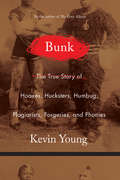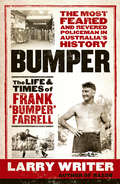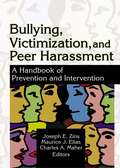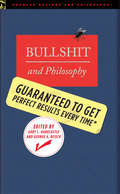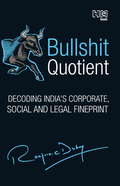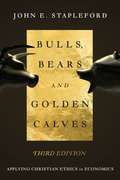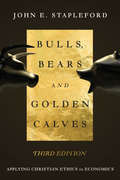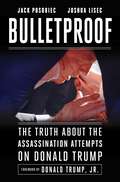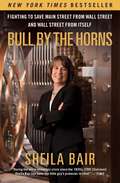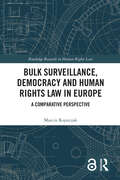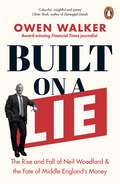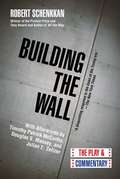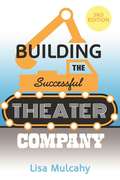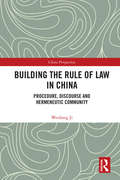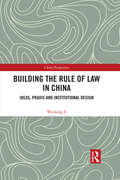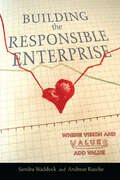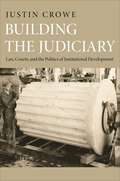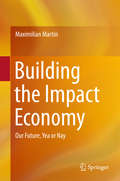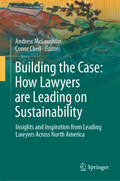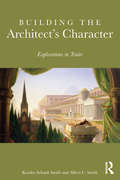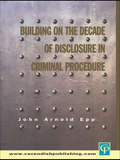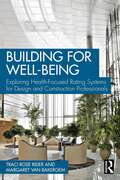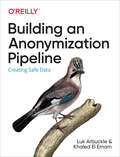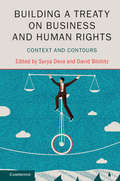- Table View
- List View
Bunk: The Rise of Hoaxes, Humbug, Plagiarists, Phonies, Post-Facts, and Fake News
by Kevin YoungLonglisted for the National Book Award for Nonfiction“There Kevin Young goes again, giving us books we greatly need, cleverly disguised as books we merely want. Unexpectedly essential.”—Marlon JamesAward-winning poet and critic Kevin Young tours us through a rogue’s gallery of hoaxers, plagiarists, forgers, and fakers—from the humbug of P. T. Barnum and Edgar Allan Poe to the unrepentant bunk of JT LeRoy and Donald J. Trump. Bunk traces the history of the hoax as a peculiarly American phenomenon, examining what motivates hucksters and makes the rest of us so gullible. Disturbingly, Young finds that fakery is woven from stereotype and suspicion, race being the most insidious American hoax of all. He chronicles how Barnum came to fame by displaying figures like Joice Heth, a black woman whom he pretended was the 161-year-old nursemaid to George Washington, and What Is It?, an African American man Barnum professed was a newly discovered missing link in evolution.Bunk then turns to the hoaxing of history and the ways that forgers, plagiarists, and journalistic fakers invent backstories and falsehoods to sell us lies about themselves and about the world in our own time, from pretend Native Americans Grey Owl and Nasdijj to the deadly imposture of Clark Rockefeller, from the made-up memoirs of James Frey to the identity theft of Rachel Dolezal. In this brilliant and timely work, Young asks what it means to live in a post-factual world of “truthiness” where everything is up for interpretation and everyone is subject to a pervasive cynicism that damages our ideas of reality, fact, and art.
Bumper
by Larry WriterFrank 'Bumper' Farrell was the roughest, toughest street cop and leader of a vice squad Australia has ever seen. Strong as a bull, with cauliflowered ears and fists like hams, Bumper's beat from 1938 to 1976 was the most lawless in the land - the mean streets of Kings Cross and inner Sydney. His adversaries were such notorious criminals as Abe Saffron, Lennie McPherson, Tilly Devine and Kate Leigh and their gangs as well as the hooligans, sly groggers, SP bookies, pimps and spivs. Criminals knew just where they stood: he would catch them, he would hurt them, and then he would lock them away. He was a legendary Rugby League player for Newtown, and represented Australia against England and New Zealand. Here's Bumper Farrell in brutal, passionate and hilarious action . . . saving Ita Buttrose from a stalker, sparking a national scandal when accused of biting off a rival player's ear, beating Lennie McPherson so severely the hard man cried, single-handedly fighting a mob of gangsters in Kings Cross and winning, terrorising the hoons who harassed the prostitutes in the brothel lanes by driving over the top of them, commandeering the police launch to take him home to his beach home, diving overboard in full uniform and catching a wave to shore dispensing kindness and charity to the poor. Bumper Farrell: lawman, sportsman, larrikin . . . legend.
Bullying, Victimization, and Peer Harassment: A Handbook of Prevention and Intervention
by Maurice Elias Charles A Maher Joseph ZinsA comprehensive examination of theory, research, prevention and intervention, and professional practice issues - in one source. Teasing, shunning, and bullying can have serious detrimental effects on both victim and perpetrator. Bullying, Victimization, and Peer Harassment: A Handbook of Prevention and Intervention comprehensively gathers emerging research, theory, and effective practice on this subject into one invaluable source. This thorough review of a wide spectrum of innovative, evidence-based practices targets the complex problems of victimization, peer harassment, and bullying in our schools. Interventions range from individuals and their peers to broad, systems-level change within schools and communities. The challenge of prevention is also explored, using the latest studies as a practical foundation. Suggestions are provided detailing effective strategies to make changes in the culture within schools while offering directions for future research and practice.Bullying, Victimization, and Peer Harassment discusses research on current intervention programs now in place that, until now, has never been evaluated. Several of the studies address middle school issues and multi-ethnic populations, including those from the United States, Canada, and Europe. Peer sexual harassment and dating-related aggression are examined that includes and goes beyond traditional views of bullying and peer intimidation. This valuable handbook provides concise yet extensive information on the most current theory, empirical research, practice guidelines, and suggestions for preparing schools for programmatic initiatives.Topics in Bullying, Victimization, and Peer Harassment include: theory and conceptual issues in victimization, bullying, and peer harassment assessment results from a four-year longitudinal study on peer victimization in early adolescents youth perceptions toward bullying high school students’ victimization profiles immigrant children and victimization evaluating an adolescent violence prevention program a school-based intervention program peer group intervention interventions for victims multiple perspectives involving sexual harassment school-wide approaches to prevention and intervention and much more! Bullying, Victimization, and Peer Harassment is a crucial resource for researchers and mental health professionals who work in schools and who work with children and their families, such as school psychologists, counselors, clinical child psychologists, social workers, and community psychologists.
Bullshit and Philosophy
by Gary L. Hardcastle George A. ReischPopular interest in bullshit - and its near relative, truthiness - is at an all-time high, but the subject has a rich philosophical history, with Hobbes, Locke, Hume, and Kant all weighing in on the matter. Here, contemporary philosophers reflect on bullshit from epistemological, ethical, metaphysical, historical, and political points of view. Tackling questions including what is bullshit, what does it do, is it a passing fad, and can it ever be eliminated, the book is a guide and resource for the many who find bullshit worth pondering.
Bullshit Quotient
by Ranjeev C. DubeyRanjeev C. Dubey, the author of this incisive, unsparing and eyeopening book, holds that we Indians have an extra `credulity chromosome? built into our DNA. He believes that we are wired to unquestioningly trust those who exercise authority over us, or those whom we admire, even as they unashamedly scam us. In this book, he sets out to dissect the bullshit that surrounds aspects of modern Indian corporate, social, political and legal life. In doing this, he asks and answers basic questions about our society. Who runs the corporate ship and why? Who is making the stock market tick and how? What are health care facilities here to do? What is the role of sleaze and grease in the determination of public policy? Bullshit Quotient: Decoding India?s Corporate, Social and Legal Fineprint offers radical revelations: Indian industrial might is built on the back of a colossal land grab. Criminal cases are business scores being settled through intimidation. Brands and Trademarks are tools to scam consumers. Corruption is necessary so that we may fund our democracy. If you want to understand what?s really going on out there, this book is for you.'
Bulls, Bears and Golden Calves: Applying Christian Ethics in Economics
by John E. StaplefordSelf-interest, economic efficiency and private property rights are among the most basic assumptions of market economics. But can an economic theory built on these assumptions alone provide adequate insight into human nature, motivation and ultimate goals to guide our economic life? The author says no, along with those economists who recognize the limits of their discipline. He insightfully shows us in detail how ethics are inextricably intertwined with economic life and analysis. Writing from a Christian ethical perspective, he interacts with seven standard introductory economics texts, exploring the moral challenges embedded in various macro-, micro- and international economic theories and outlining a faithful response to them. The third edition includes two new chapters on economics as a science and global poverty plus expanded discussions of entitlements, government debt, healthcare reform and immigration reform. This book will be especially useful for introductory courses in economics.
Bulls, Bears and Golden Calves: Applying Christian Ethics in Economics
by John E. StaplefordSelf-interest, economic efficiency and private property rights are among the most basic assumptions of market economics. But can an economic theory built on these assumptions alone provide adequate insight into human nature, motivation and ultimate goals to guide our economic life? John Stapleford says no, along with those economists who recognize the limits of their discipline. He insightfully shows us in detail how ethics are inextricably intertwined with economic life and analysis. Writing from a Christian ethical perspective, he interacts with seven standard introductory economics texts, exploring the moral challenges embedded in various macro-, micro- and international economic theories and outlining a faithful response to them. The third edition includes two new chapters on economics as a science and global poverty plus expanded discussions of entitlements, government debt, healthcare reform and immigration reform. Keyed to seven of the most widely used introductory economics texts—Gwartney, Stroup Sobel; Mankiw; Mansfield Behravesh; McConnell Brue; Miller; Samuelson Nordhaus; and Stiglitz—this book will be especially useful for introductory courses in economics.
Bulletproof: The Truth about the Assassination Attempts on Donald Trump
by Jack Posobiec Joshua LisecFrom New York Times Bestselling Authors of Unhumans, Jack Posobiec and Joshua Lisec The Unanswered Questions of the Most Consequential Summer in American Political History We the people of the United States have questions. And we deserve answers. Bulletproof: The Truth about the Assassination Attempts on Donald Trump is the first complete preliminary investigative report on the attempted assassination of President Donald J. Trump that occurred on July 13, 2024, at 6:11 p.m. Eastern Daylight Time in Butler, PA, USA. Bulletproof reconstructs a minute-by-minute parallel timeline of each step of that fateful July day for President Trump, law enforcement agencies, and the would-be assassin and digs deeper than the official narrative, asking uncomfortable questions about how this event occurred and going deeper than mainstream media ever will. In addition, Bulletproof breaks new and exclusive stories from an independent private investigator team commissioned by the authors into the hidden life of shooter Thomas Matthew Crooks, and also breaks new ground, digging into the best-kept-secret details of how the failed &“hit&” on Trump dominoed into a palace coup of a sitting US president. Posobiec and Lisec bring the receipts. Bulletproof is also first to cover the assassination attempt that occurred two months later on September 15, 20204, at 1:30 p.m. EDT at Trump International Golf Club in West Palm Beach, FL, USA. The book curates what is known about the would-be shooter, Ryan Wesley Routh, and his complex ties to shadowy foreign fighter operations. May this public record serve the American people and those of the world who seek answers, question narratives, and hold all perpetrators accountable for their sins. Truth and justice will prevail.
Bull by the Horns: Fighting to Save Main Street from Wall Street and Wall Street from Itself
by Sheila BairNEW YORK TIMES and WALL STREET JOURNAL BESTSELLER The former FDIC chairwoman, and one of the first people to acknowledge the full risk of subprime loans, offers a unique perspective on the financial crisis.Appointed by George W. Bush as the chairman of the Federal Deposit Insurance Corporation (FDIC) in 2006, Sheila Bair witnessed the origins of the financial crisis and in 2008 became—along with Hank Paulson, Ben Bernanke, and Timothy Geithner—one of the key public servants trying to repair the damage to the global economy. Bull by the Horns is her remarkable and refreshingly honest account of that contentious time and the struggle for reform that followed and continues to this day.
Bulk Surveillance, Democracy and Human Rights Law in Europe: A Comparative Perspective (Routledge Research in Human Rights Law)
by Marcin RojszczakThis book discusses contemporary standards of legal safeguards in the area of bulk electronic surveillance from the perspective of the European legal model. Bulk, or untargeted, surveillance, although traditionally associated with the interception of electronic communications, is increasingly used as a convenient tool for collecting information on large groups of society. The collection of redundant information, which is intrinsic to bulk surveillance, is no longer a side effect but an important objective of the use of bulk powers. As a result, untargeted surveillance is everywhere increasingly being implemented, and without any clear link to state security or crime-fighting objectives. This work examines the origins of untargeted measures, explores their mechanics and key concepts, and defines what distinguishes them from other forms of surveillance. The various elements of the legal safeguards in place, which are fundamental to protecting individuals from the risks of abuse of power, are analysed in detail. The book discusses not only the different standards of legal safeguards, but also gives examples of their implementation in individual European countries. It also examines the relationship between the development of the global data market and untargeted surveillance powers, in particular in the context of the risks associated with algorithmic surveillance, client-side scanning, the privatisation of surveillance – or surveillance as a service – and the increasingly widespread use of preventive content filtering mechanisms. The book will be a valuable resource for academics and researchers working in the areas of law, international relations, public policy, engineering and sociology. It will also appeal to professionals dealing with various aspects of the use of surveillance measures, such as experts, members of the legislature and law enforcement agencies.
Built on a Lie: The Rise and Fall of Neil Woodford and the Fate of Middle England’s Money
by Owen WalkerHe was the most celebrated and successful British investor of his generation - but it was all built on a lie. Neil Woodford spent years beating the market; betting against the dot com bubble and the banks before the financial crash in 2008, making blockbuster returns for investors and earning himself a reputation of 'the man who made Middle England rich'.But, in 2019, Woodford's asset management company collapsed, trapping hundreds of thousands of rainy-day savers in his flagship fund and hanging £3.6 billion in the balance.In Built on a Lie, Financial Times reporter Owen Walker reveals the disastrous failings of Woodford, the greed at the heart of his operation and the full, jaw-dropping story of Europe's biggest investment scandal in a decade.'Vital financial journalism with heart' Emma Barnett, broadcaster'This is a must read!' Vince Cable, former leader of the Liberal Democrats'Reads like a rip roaring tale of a corporate high wire act' John McDonnell, former Shadow Chancellor'Should be sold with a bottle of blood-pressure pills' Edward Lucas, The Time
Building the Wall: The Play and Commentary (Oberon Modern Plays Ser.)
by Julian E. Zelizer Douglas S. Massey Robert Schenkkan Timothy Patrick McCarthyIn the tradition of Hamilton and Angels in America, a powerful, politically charged, dystopian drama that couldn’t be more timely. Written in a “white-hot fury” on the eve of the 2016 election, the stunning new play by Pulitzer Prize– and Tony Award–winning dramatist Robert Schenkkan is creating a nationwide sensation. Bypassing the usual development path for plays, it has been signed up to open in five theaters across America in a National New Play Network Rolling World Premiere, starting in Los Angeles (March) and Denver (April) and continuing in the Washington, DC, area, Tucson, and Miami, with more productions to follow, including in Santa Fe and New York City. Building the Wall lays out in a harrowing drama the consequences of Donald Trump’s anti-immigration campaign rhetoric turned into federal policy. Two years from now, that policy has resulted in the mass round-up of millions of illegal aliens, with their incarceration overflowing into private prisons and camps reminiscent of another century. The former warden for one facility is awaiting sentencing for what happened under his watch. In a riveting interview with a historian who has come seeking the truth, he gradually reveals how the unthinkable became the inevitable, and the faceless illegals under his charge became the face of tragedy. The play is accompanied by commentary from three prominent scholars: on the real purpose of the border wall, our dark nativist history of restricting immigration, and the tradition of political protest in art.
Building the Successful Theater Company
by Lisa MulcahyWhat makes a theater company successful? Lisa Mulcahy poses the question to leaders from nineteen of the country’s most diverse and vital theater companies from the recent past and present, and offers answers in Building the Successful Theater Company. Producers, stage managers, directors-anyone dreaming of running a theater troupe-will benefit from the practical guidance, amusing anecdotes, and sincere advice in this peek behind the curtains of the often difficult, always seductive, profession of theater. With five additional companies profiled in this fully revised third edition, Building a Successful Theater Company features: The LABrynth Theater Company New Paradise Laboratories National Theatre of the Deaf Shotgun Players Asian-American Theatre Company Steppenwolf Theater Company The Pasadena Playhouse La Jolla Playhouse Chicago City Limits Berkeley Repertory Theatre Arena Stage’s The Living Stage Theatre Company Mixed Blood Theatre Company Horizons Theatre Wheelock Family Theatre L.A. Theatre Works A Traveling Jewish Theatre Jean Cocteau Repertory Bailiwick Repertory New Repertory TheatreNew chapters cover funding and financial aspects, maximizing a company's potential through powerful social media use, and creating successful partnerships by teaming up with corporate sponsors and establishing artistic collaborations. Stage veterans reveal advice on everything from locating performance space, to developing a business plan, to and rehearsing and publicizing productions in this invaluable guide to creating or growing a theater company.Allworth Press, an imprint of Skyhorse Publishing, publishes a broad range of books on the visual and performing arts, with emphasis on the business of art. Our titles cover subjects such as graphic design, theater, branding, fine art, photography, interior design, writing, acting, film, how to start careers, business and legal forms, business practices, and more. While we don't aspire to publish a New York Times bestseller or a national bestseller, we are deeply committed to quality books that help creative professionals succeed and thrive. We often publish in areas overlooked by other publishers and welcome the author whose expertise can help our audience of readers.
Building the Rule of Law in China: Procedure, Discourse and Hermeneutic Community (China Perspectives)
by Weidong JiAfter thirty years of Mao era (1949-1979) which was struggle-based, the Communist Party of China has begun to change its position as a pioneering revolutionary party, evolving into a universal ruling party that transcends class interests. Meanwhile, administrative and judicial reforms oriented toward a more efficient, serving government and the rule of law have been actively carried out. As the earliest work on constructive jurisprudence of new proceduralism in China, this book elucidates some of the most critical problems in the process of constructing a legal order and realizing institutional innovation in China: democracy, fair and reasonable procedure, interpretation techniques, cognitive ability of legislation, position and function of the jurist group, and professional ethics, etc. Besides, it expounds five pairs of contradictions in the modernization process of Chinese legal system, namely, substantial and procedural justice, moral and legal debates, formal and reflective rationality, the major responsibility on bureaucrats and lawyers, and the motivation of public welfare and profit, and explores appropriate approaches to combine the different factors. Scholars and students in Chinese legal and social transformation studies will be attracted by this book. Furthermore, it will help different civilizations conduct rational dialogues on justice and order.
Building the Rule of Law in China: Ideas, Praxis and Institutional Design (China Perspectives)
by Weidong JiAfter thirty years of Mao era (1949-1979) which was struggle-based, the Communist Party of China has begun to change its position as a pioneering revolutionary party, evolving into a universal ruling party that transcends class interests. Meanwhile, administrative and judicial reforms oriented toward a more efficient, serving government and the rule of law have been actively carried out. As the earliest work on constructive jurisprudence of new proceduralism in China, this book elaborates on the ideological confrontation on the "direction of China". It includes academic debates on politics and law which the author has been involved in, and top-level institutional design in China. Besides, this book introduces, analyzes and evaluates the focus of Chinese contemporary jurisprudence, making some critical summarizing propositions on the practical experiences. A review of Western contemporary jurisprudence and the forefront of legal research is also covered, aiming to provide ideological resources for the rule of law in China. Scholars and students in Chinese legal and social transformation studies will be attracted by this book. Furthermore, it will help different civilizations conduct rational dialogues on justice and order.
Building the Responsible Enterprise: Where Vision and Values Add Value
by Sandra Waddock Andreas RascheBuilding the Responsible Enterprise provides students and practitioners with a practical, yet academically rooted, introduction to the state-of-the-art in sustainability and corporate social responsibility. The book consists of four parts, highlighting different aspects of corporate responsibility. Part I discusses the context in which corporate responsibility occurs. Part II looks at three critical issues: the development of vision at the individual and organizational levels, the integration of values into the responsible enterprise, and the ways that these building blocks create added value for a firm. Part III highlights the actual management practices that enable enterprises to achieve excellence, focusing on the roles that stakeholder relationships play in improving performance. The book concludes with a conversation about responsible management in the global village, examining the emerging infrastructure in which enterprise finds itself today. Throughout the text, cases exemplify key concepts and highlight companies that are guiding us into tomorrow's business environment.
Building the Judiciary: Law, Courts, and the Politics of Institutional Development (Princeton Studies in American Politics: Historical, International, and Comparative Perspectives #129)
by Justin CroweHow did the federal judiciary transcend early limitations to become a powerful institution of American governance? How did the Supreme Court move from political irrelevance to political centrality? Building the Judiciary uncovers the causes and consequences of judicial institution-building in the United States from the commencement of the new government in 1789 through the close of the twentieth century. Explaining why and how the federal judiciary became an independent, autonomous, and powerful political institution, Justin Crowe moves away from the notion that the judiciary is exceptional in the scheme of American politics, illustrating instead how it is subject to the same architectonic politics as other political institutions. Arguing that judicial institution-building is fundamentally based on a series of contested questions regarding institutional design and delegation, Crowe develops a theory to explain why political actors seek to build the judiciary and the conditions under which they are successful. He both demonstrates how the motivations of institution-builders ranged from substantive policy to partisan and electoral politics to judicial performance, and details how reform was often provoked by substantial changes in the political universe or transformational entrepreneurship by political leaders. Embedding case studies of landmark institution-building episodes within a contextual understanding of each era under consideration, Crowe presents a historically rich narrative that offers analytically grounded explanations for why judicial institution-building was pursued, how it was accomplished, and what--in the broader scheme of American constitutional democracy--it achieved.
Building the Impact Economy: Our Future, Yea or Nay
by Maximilian MartinThis book develops a comprehensive framework for creating sustainable new business approaches on a massive scale. It relates the power of entrepreneurship, investment and technology to four areas in which progress is urgently needed to get out of the world's current impasse. These are: game-changing innovations in companies; a way forward for the global fashion industry that reconciles competitiveness and worker dignity; turning around the energy crisis; and restoring capital markets to being the funders of human progress and prosperity that they once were--the pieces of the puzzle that is our future. Numerous case studies and actionable guidelines show how to concretely get the job done.
Building the Fourth Estate: Democratization and the Rise of a Free Press in Mexico
by Chappell H. LawsonIn the wake of the recent ground-breaking democratic reforms in Mexico, including this summer's unprecedented election of a non-PRI presidential candidate for the first time in almost a century, this book shows how the Mexican media played a crucial role in the country's democratic transformation.
Building the Case: Insights and Inspiration from Leading Lawyers Across North America
by Andrew McLaughlin Conor ChellThis book aims to inspire a new generation of lawyers by showcasing real-life case studies of how legal professionals have built successful and rewarding careers in the field of sustainability. In the corporate world, over the last decade environmental, social and governance (ESG) and sustainability considerations have moved from the fringe to the mainstream - a shift that has faced significant backlash in certain quarters. At the same time, the global backdrop has become increasingly complex, marked by the accelerating impacts of climate change (e.g. historic floods and wildfires), political polarization, economic uncertainty, wars, and the further erosion of trust in our institutions. In this new era, corporate leadership is increasingly turning to lawyers, both in-house and external counsel, to help lead the way in navigating these complexities and to pursue opportunities through the green energy transition. This book brings together a diverse group of leading lawyers who have spearheaded innovative initiatives to drive positive environmental and social change. These thought leaders share their firsthand experiences, challenges, and triumphs, providing inspiration for aspiring lawyers eager to make a meaningful impact in their careers.
Building the Architect's Character: Explorations in Traits
by Albert C. Smith Kendra Schank SmithAn understanding of architects’ character traits can offer important insights into how they design buildings. These traits include leadership skills necessary to coordinate a team, honest and ethical behavior, being well educated and possessing a life-long love of learning, flexibility, resourcefulness, and visionary and strategic thinking. Characteristics such as these describe a successful person. Architects also possess these traits, but they have additional skills specifically valuable for the profession. These will include the ability to question the use of digital media, new materials, processes, and methods to convey meaning in architectural form. Although not exhaustive, a discussion of such subjects as defining, imaging, persuading, and fabricating will reveal representational meaning useful for the development of an understanding of architects’ character. Through the analogies and metaphors found in Greek myth, the book describes the elusive, hard-to-define characteristics of architects to engage the dilemmas of a changing architectural landscape. Building the Architect’s Character: Explorations in Traits examines traditional and archetypal characteristics of the successful architect to ask if they remain relevant today.
Building on The Decade of Disclosure In Criminal Procedure
by John EppFirst published in 2001. Routledge is an imprint of Taylor & Francis, an informa company.
Building for Well-Being: Exploring Health-Focused Rating Systems for Design and Construction Professionals
by Traci Rose Rider Margaret van BakergemBuilding for Well-Being is the first introduction to health-focused building standards for design and construction professionals. More than a summary of the state of the field, this practical resource guides designers, builders, developers, and owners through considerations for incorporating WELL®, Fitwel®, and other systems from the planning phase to ground-breaking and beyond. Side-by-side comparisons of established and emerging health-focused standards empower building professionals to select the most appropriate certifications for their projects. Drawing on the authors’ backgrounds in sustainable design and public health, chapters on the evolution of the green building movement and the relationship between health and the built environment provide vital context for understanding health-focused standards and certifications. The final chapter looks toward the future of health and the built environment.
Building an Anonymization Pipeline: Creating Safe Data
by Luk Arbuckle Khaled El EmamHow can you use data in a way that protects individual privacy but still provides useful and meaningful analytics? With this practical book, data architects and engineers will learn how to establish and integrate secure, repeatable anonymization processes into their data flows and analytics in a sustainable manner.Luk Arbuckle and Khaled El Emam from Privacy Analytics explore end-to-end solutions for anonymizing device and IoT data, based on collection models and use cases that address real business needs. These examples come from some of the most demanding data environments, such as healthcare, using approaches that have withstood the test of time.Create anonymization solutions diverse enough to cover a spectrum of use casesMatch your solutions to the data you use, the people you share it with, and your analysis goalsBuild anonymization pipelines around various data collection models to cover different business needsGenerate an anonymized version of original data or use an analytics platform to generate anonymized outputsExamine the ethical issues around the use of anonymized data
Building a Treaty on Business and Human Rights: Context and Contours
by Surya Deva David BilchitzThe calls for an international treaty to elaborate the human rights obligations of transnational corporations and other business enterprises have been rapidly growing, due to the failures of existing regulatory initiatives in holding powerful business actors accountable for human rights abuses. In response, Building a Treaty on Business and Human Rights explores the context and content of such a treaty. Bringing together leading academics from around the world, this book engages with several key areas: the need for the treaty and its scope; the nature and extent of corporate obligations; the role of state obligations; and how to strengthen remedies for victims of human rights violations by business. It also includes draft provisions for a proposed treaty to advance the debate in this contentious area and inform future treaty negotiations. This book will appeal to those interested in the fields of corporate social responsibility and business and human rights.
